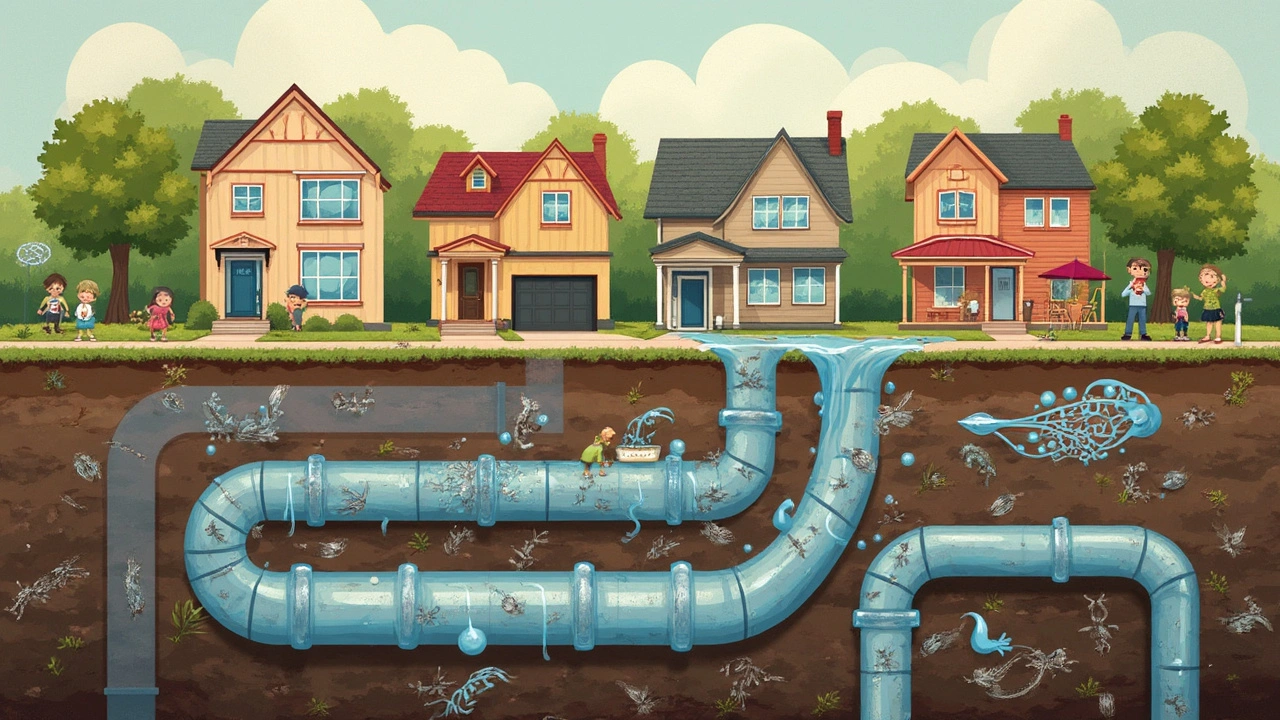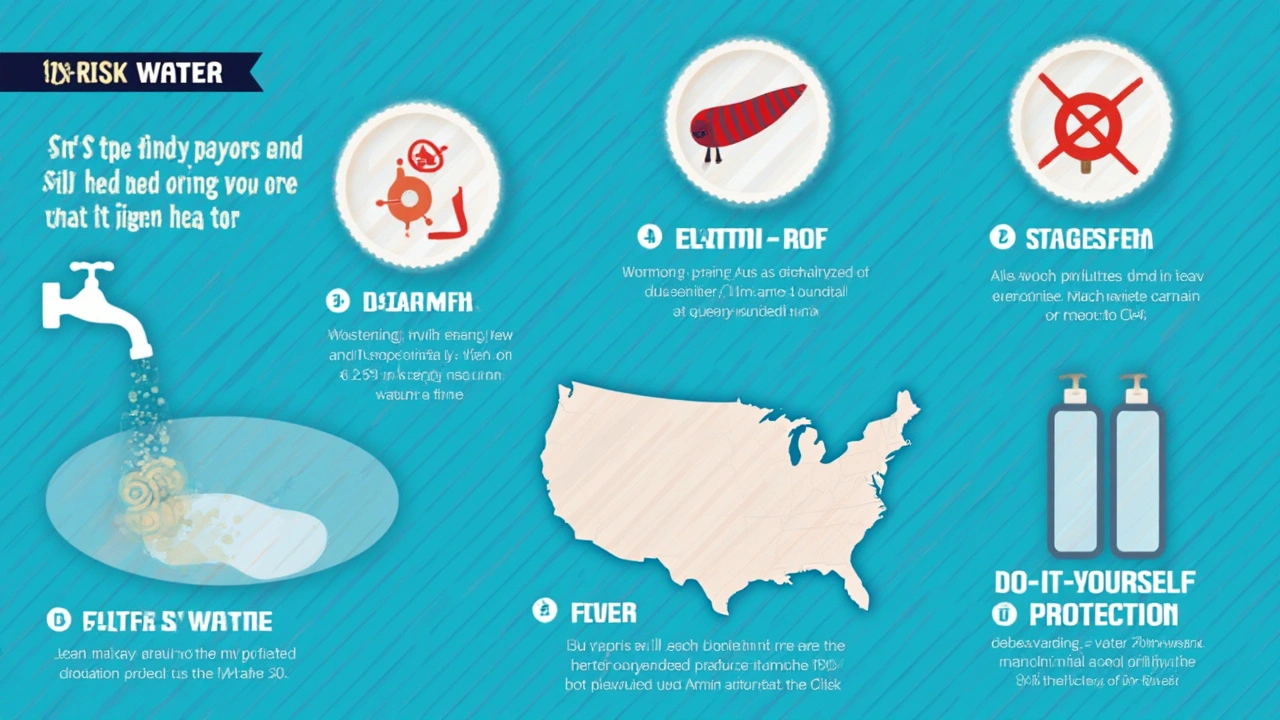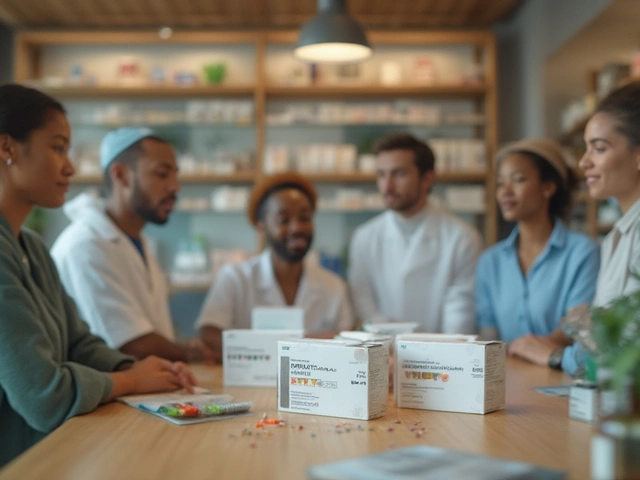Most people don’t realize their tap or well water could be home to tiny troublemakers—parasites you can’t see but that can do a real number on your gut. You don’t have to be hiking in the wilderness to run into waterborne parasites. A broken pipe, heavy rain, or poor plumbing at home can let these pests slip right in.
If you’ve ever had a stomach bug that came out of nowhere, parasites like Giardia or Cryptosporidium might be the reason. They don’t care if your water looks clear and tastes fine—their eggs, called cysts or oocysts, are too small to notice without a microscope. Boiling water, using a good filter, or sticking to sealed bottled drinks can seriously cut your risk. Don’t count on bleach alone—many parasites laugh it off and keep going.
- How Parasites Get into Water
- Common Parasites You Could Meet
- Symptoms to Watch Out For
- Who Is Most at Risk?
- How to Protect Yourself and Your Family
How Parasites Get into Water
It’s wild how easily parasitic infection can spread just through what comes out of your faucet or garden hose. Let’s break down how these unwanted guests sneak in. Parasites end up in water mainly because of poop—yeah, human or animal waste. When toilets don’t drain right, septic tanks leak, or farms let manure runoff into streams, it creates a parasite highway. Heavy rain or floods only make things worse by washing more germs into the water.
Municipal water plants usually kill most germs, but their systems aren’t perfect. Sometimes things slip past filters, especially if the city has old pipes or stormwater mixes with drinking water lines. Even swimming pools and splash pads can spread waterborne parasites if they aren’t clean, or if people swim while sick. Kids are especially good at sharing these bugs without meaning to!
If you use a private well, risks are higher. Wells close to farms or septic tanks have the greatest chance of parasite contamination. Animal droppings or surface water can leak into the well, especially after big storms. If you drink untreated river or lake water while camping, it’s almost a guarantee you’ll swallow some kind of parasite.
- Contaminated runoff from farms and homes
- Broken or poor plumbing and old pipes
- Floods carrying waste into water supplies
- Swimming pool or hot tub water not properly disinfected
- Direct contact with untreated lakes, rivers, or wells
Here’s how often these problems show up around the world:
| Source of Contamination | % of Waterborne Outbreaks |
|---|---|
| Fecal Waste in Runoff | 37% |
| Old or Broken City Pipes | 22% |
| Private Wells | 17% |
| Swimming Pools | 8% |
| Other (Floods, Storms, etc.) | 16% |
The takeaway? Pay close attention to water quality. If your water source could be exposed to animal or human waste—even just once—you could be at risk for a parasitic infection.
Common Parasites You Could Meet
If you drink, cook, or wash up with water that’s not clean, you could run into some pretty nasty parasitic infection culprits. These little troublemakers don’t always announce themselves until you’re feeling sick. Here are a few of the most common waterborne parasites you should know about, especially if your local water quality isn’t the best.
- Giardia lamblia: This one’s famous for causing “beaver fever.” It spreads when infected poop gets into water sources—think lakes, streams, or even your own tap if things go wrong at the water plant. It survives regular chlorine treatments, which is why it’s a big deal in public pools and even some city water systems.
- Cryptosporidium: This parasite is extra tough. Its outer shell lets it survive for days, even in chlorinated water. A big Crypto outbreak in Milwaukee back in 1993 left over 400,000 people sick—so you can see how easy it is for a city’s whole water supply to get hit.
- Entamoeba histolytica: More common in developing countries, this parasite shows up in water tainted with sewage. If you’re traveling or living somewhere without good water treatment, this guy can give you bloody diarrhea and stomach cramps.
- Schistosoma: Unlike the others, Schistosoma doesn’t come from swallowing water but from swimming or wading in freshwater where the parasite’s larvae are waiting. They burrow right through the skin. It’s a huge problem in parts of Africa, South America, and Asia.
- Dracunculus medinensis (Guinea worm): Thankfully, this one’s nearly wiped out. But in the past, people would get infected by drinking water with tiny water fleas carrying the worm’s larvae. The good news is, filtering water through a simple cloth stopped most cases.
| Parasite | Survival Time in Water |
|---|---|
| Giardia | Up to 2 months (cold water) |
| Cryptosporidium | Several days at room temp, weeks if it's cooler |
| Entamoeba | Several weeks in damp soil or water |
The scary part is, a sip or two is often enough for an infection. Kids, older folks, and anyone with a weak immune system are at higher risk. Even people who love outdoor adventures—if you brush your teeth or fill your bottle from a stream—are playing the odds. Understanding these waterborne parasites makes it easier to stay safe and choose better ways to clean your water at home and on the go.

Symptoms to Watch Out For
Not every upset stomach comes from a bad meal—sometimes, it’s a parasitic infection picked up from sketchy water. Parasites in your water can cause lots of trouble, and their signs aren’t always easy to spot right away. Watch out for these symptoms if you’ve had any contact with questionable water quality or you’re feeling off after a camping trip, travel, or a local water advisory.
- Diarrhea: The big one. It’s often watery, lasts for days, and sometimes smells worse than usual.
- Stomach cramps and bloating: Annoying pains and swelling aren’t just uncomfortable, they’re possible signals a parasite has moved in.
- Nausea and vomiting: If your water is tainted, you might feel sick to your stomach or even throw up, especially in the first week after exposure.
- Fatigue: Feeling wiped out isn’t just from the bathroom trips—parasites can mess with your body’s ability to absorb nutrients.
- Unexplained weight loss: Losing weight when you’re not trying, especially if you’ve got other symptoms, can point to parasites like Giardia or Cryptosporidium.
- Dehydration: Water loss from frequent diarrhea or vomiting leaves you thirsty, dizzy, and with a dry mouth.
Here’s a quick look at symptoms from the most common waterborne parasites:
| Parasite | Main Symptoms | How Soon After Exposure? |
|---|---|---|
| Giardia | Watery diarrhea, cramps, flatulence, bloating | 1-3 weeks |
| Cryptosporidium | Severe diarrhea, stomach pain, dehydration | 2-10 days |
| Entamoeba histolytica | Bloody diarrhea, fever, stomach pain | 1-4 weeks |
| Schistosoma | Blood in urine or stool, itchy rash, fever | 2-6 weeks |
If symptoms show up, especially after contact with unsafe water or during an outbreak, don’t wait it out. Call your doctor and mention any recent exposures. Quick treatment stops things from getting worse, especially for kids, older adults, or anyone with ongoing health problems.
Who Is Most at Risk?
Some folks are way more likely to get hit hard by a parasitic infection from bad water. Kids under five, pregnant women, older adults, and anyone with a weaker immune system top the list. This also covers folks going through chemo, living with HIV, or taking immune-suppressing meds.
If you rely on private wells or live in places where city water treatment isn’t that great, you’re probably more exposed. The CDC has shown that rural families with private wells face up to twice the risk for waterborne parasites compared to those in cities with good treatment plants. Camping, hiking, or traveling to places with sketchy water? You’re in the mix, too.
Here’s a quick look at who’s rolling the dice with water quality and waterborne parasites:
- Little kids and babies (their guts aren’t ready for these bugs)
- Pregnant people (immunity goes down a notch)
- Older folks (immune systems slow down with age)
- People with HIV/AIDS or on chemo (tiny exposures hit them harder)
- Anyone using untreated well water
- People who spend time outdoors and drink untreated water
- Travelers visiting countries with poor water quality
Sometimes it seems random who gets sick and who doesn’t, but the odds are stacked higher against folks with weaker defenses. If you’re in one of these groups, it’s a smart move to keep tabs on your water source and use filters or boiled water when things seem off.
| Group | Relative Risk (vs. general population) |
|---|---|
| Children under 5 | 2-4x more likely |
| Immunocompromised adults | 3-10x more likely |
| Travelers to high-risk regions | ~2x more likely |

How to Protect Yourself and Your Family
Keeping your family safe from parasitic infection isn’t complicated, but you do have to be careful about your water. Even city water can sometimes carry waterborne parasites, especially after heavy rain or plumbing repairs. Have you ever seen a boil water notice? That’s no joke—those notices mean something risky could be lurking in your pipes.
The first line of defense is to know where your water comes from. If it’s a private well, get it tested at least once a year for parasites and bacteria. After a flood or if your water looks weird, test it again. Municipal water isn’t immune either—occasional outbreaks of things like Giardia or Cryptosporidium have even made the news. When in doubt, don’t risk it.
- Boil water for at least one minute if you are unsure about its safety (longer at higher elevations).
- Use a water filter that’s certified to remove waterborne parasites like Giardia and Cryptosporidium. These usually have a pore size of 1 micron or smaller.
- Bottled water is usually a safe bet, especially if you’re traveling or there’s a local advisory.
- Don’t brush your teeth, wash food, or make ice with tap water when there’s any chance it’s contaminated.
- Take special care when swimming, especially in lakes, rivers, or even public pools—never swallow the water.
You’ve got to be extra careful if there are kids, elderly folks, or anyone with a weak immune system at home. Their bodies can have a harder time fighting off infections. Simple habits like washing your hands after using the bathroom and before eating go a long way, too.
| Method | Effective Against Parasites |
|---|---|
| Boiling (1+ min) | Yes |
| Certified 1-micron filter | Yes |
| Bottled/sealed water | Yes |
| Household bleach | No (not always) |
| UV purifier | Yes, if used correctly |
Don’t just trust a clear glass—clean water doesn’t always look or smell different, but a tiny parasite donut can cause days of misery. So, follow these steps, make them part of your routine, and you’ll keep those unwanted guests out of your home (and your stomach).




Daniel Buchanan
July 17 2025This is a really important topic that doesn’t get enough attention. Waterborne parasitic infections can be devastating, especially in areas with poor sanitation. It’s crucial to know which parasites to look out for and the symptoms they cause. For example, Giardia and Cryptosporidium are common culprits that cause gastrointestinal issues.
What I particularly liked about this article is how it breaks down the risks depending on water quality and environment. It’s not always obvious when your water is unsafe, so those tips on identifying contaminated water are super helpful. Has anyone here had personal experience with these infections or water safety challenges?
Also, prevention techniques like boiling water or using portable filters are vital for anyone traveling or living in high-risk areas. I’d recommend people always carry some sort of treatment method if they’re unsure about their water source.